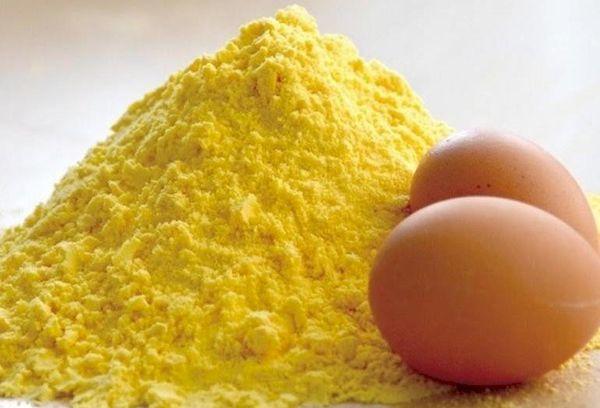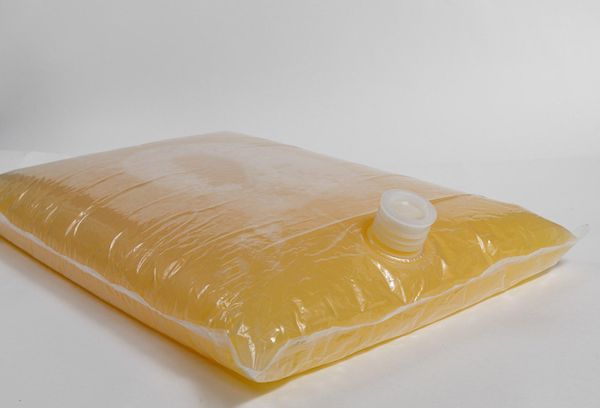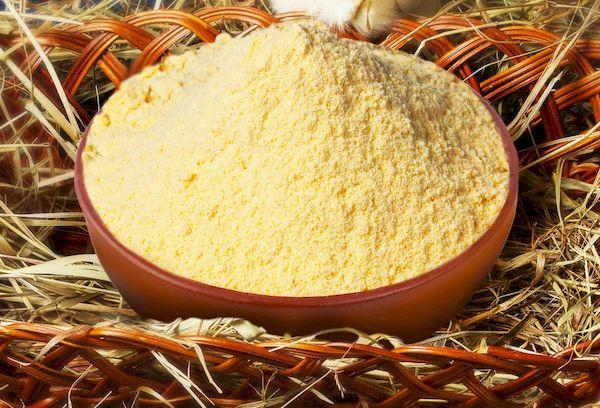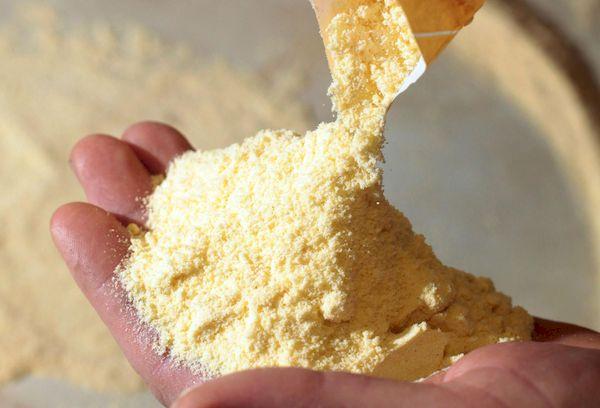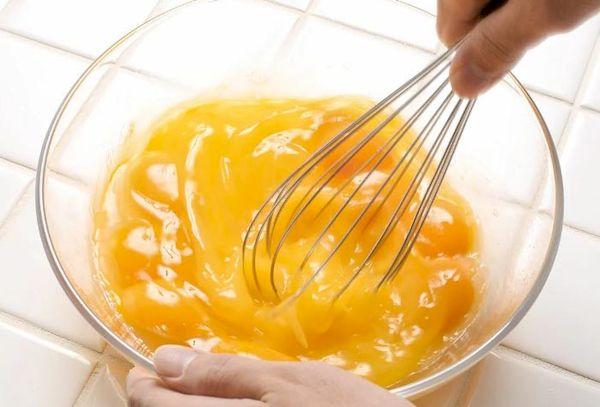Egg melange: storage time and temperature
Content:
Whole chicken eggs are rarely used in food production; they are replaced with a protein-yolk mixture (melange) - this product is more convenient to store and transport, as it does not have a fragile shell. But so that the semi-finished product does not lose its beneficial properties and does not deteriorate ahead of time, you should know how and at what temperature egg melange is stored. In short, it depends on the form of release - liquid must be kept at subzero temperatures, dry food does not need to be frozen. Read more about the terms, modes and other conditions of storage and use of the product in this article.
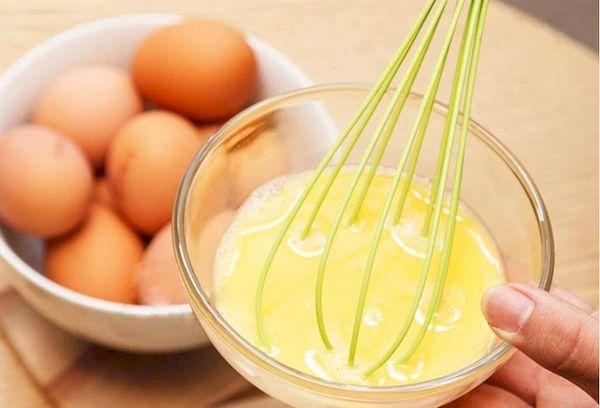
What is egg melange
Melange or egg melange (from the French “mélange” - “mixture”) is a culinary product, a semi-finished product, which is a mixture of proteins and yolks in proportions close to natural. There is a type of melange called homogeneous, when it is presented in the form of a mass consisting only of proteins or yolks.
The semi-finished product is produced by poultry factories or poultry processing plants in special melange workshops.Only chicken eggs are used as raw materials - waterfowl eggs are not suitable for these purposes due to the high risk of salmonella infection.
At the first stage, the eggs are sorted and the defects are removed. Then products of approximately the same weight and size are selected, sanitized, the shells are removed, and the resulting liquid is filtered. Further stages of production depend on what kind of product is to be obtained, liquid or dry. In the first case, the raw materials are treated with hot air and frozen, in the second they are dried (dehydrated) using special equipment.
Melange is sold in briquettes or sealed packaging. Regardless of the release form (liquid or dry), the product has a dark yellow or orange color and a natural egg aroma. At the same time, the semi-finished product does not lose the properties of natural eggs - it, like the original raw material, is enriched with the following elements:
- vitamins A, E, B2, B 6, B12, C, D, PP;
- essential amino acids (valine, leucine, lysine, tryptophan, etc.);
- nonessential amino acids (arginine, glycine, glutamic acid, tyrosine, etc.);
- potassium;
- calcium;
- magnesium;
- sodium;
- gray;
- phosphorus;
- chlorine;
- iron;
- iodine;
- cobalt;
- manganese;
- copper.
The nutritional value of 100 g of melange is:
- 157 Kcal;
- 12.7 g protein;
- 11.5 g fat;
- 0.7 g carbohydrates.
The properties and scope of application of liquid and powdered melange, which ordinary people more often call egg powder, are absolutely similar. It is used in the same way as chicken eggs - they prepare omelettes, batters, put them in sauces, baked goods, pastries, etc.Unlike fresh raw materials, melange has a long shelf life, from several months to two years, and is especially convenient in cases where it is difficult to find enough space to store whole eggs in large quantities.
Storage temperature
Important conditions for preserving the beneficial properties of melange are tight packaging, darkness, good ventilation, optimal humidity and correctly selected temperature conditions. The last parameter depends on the form in which the product is presented - liquid or dry.
Liquid egg melange - storage methods
Liquid melange is sold both frozen and chilled. In the first case, according to GOST 30363-2013 “Liquid and dry egg products for food. Technical conditions", it can be kept at temperatures from -6°C to -18°C.
It is the storage temperature that determines how long the product will remain usable:
- from -6°С to -12°С – up to 6 months;
- from -12°С to -18°С – up to 10 months;
- from -18°C and above – up to 15 months.
Some manufacturers supply melange in aseptic sealed packages. This product is intended to be stored refrigerated at a temperature of 4-6°C. It remains suitable for use for 28-30 days from the date of manufacture. After opening the package, the melange must be consumed within 24 hours. Thawed semi-finished products can be stored in the refrigerator for the same amount of time.
Dry egg melange - storage methods
Dry powder can be stored without refrigeration at temperatures above 20°C and relative humidity not higher than 75%. The packaging must be protected from direct sunlight. Under such conditions, the product can be stored for up to 6 months.
You can extend the shelf life of dry melange by placing it in the cold. At a temperature no higher than 1-2°C and humidity no more than 60-65%, it will remain usable for 12-18 months. And if you freeze the semi-finished product, it will remain edible for 2 years.
Tips and tricks
Liquid chilled melange is extremely easy to use - just open the package and you can use it for its intended purpose. With frozen it is a little more difficult; you will need to defrost it first, and it is recommended to do this in 2 stages. First, place the briquette in the refrigerator for several hours, and then continue defrosting at room temperature until completely thawed. The product cannot be re-frozen, therefore it is more often used on an industrial scale and in food service outlets where large volumes of egg mixture are required.
How to use dry melange
For household use, dry melange is more convenient - after opening the package, it is not necessary to use all the contents at once; you can store the product in the refrigerator. At low temperatures it will remain usable for 1-2 months.
It is important to properly dilute the powder before use. Procedure:
- Sift the required amount of product through a sieve. This is necessary so that large particles do not get into the mass and the output is a homogeneous mixture.
- Pour in cooled boiled water at the rate of 3-3.5 parts liquid to 1 part powder.
- Mix thoroughly so that there are no lumps and leave for 15-20 minutes to swell. During this time, you will need to re-mix the melange 2-3 times.
The semi-finished product diluted with water cannot be stored - it must be used for its intended purpose immediately.
How to make melange at home
Semi-finished egg products, both liquid and dry, can be prepared at home. But you need to understand that this product will differ from the factory one, first of all, in its shelf life. Powdered homemade melange should be stored not at room temperature, but in the refrigerator. Liquid can only be kept in the freezer and used within 2-3 months.
How to prepare a liquid semi-finished product:
- Rinse the eggs under warm water using a small amount of baking soda.
- Carefully break into a deep container so that no shell particles get in.
- Beat the mixture with a fork or blender until fluffy foam appears.
- Strain the mixture through a sieve, add a small amount of salt (on the tip of a knife), and mix again.
- Pour the mixture into a freezer container (this can be a plastic container with a tight-fitting lid, ice trays, or even a plastic bag) and place in the freezer.
The process of making dry melange is more complex and labor-intensive - special equipment is used in production for this. But you can try preparing a semi-finished product at home using a heating device and a blender.
Procedure:
- Prepare the eggs in the same way as in the previous instructions.
- Pour the strained mixture into a wide container so that it is distributed in a thin layer along the bottom. A large food tray or plastic tray will do.
- Place the product to dry near a heat source (for example, near a heater). The drying process will take at least 25-30 hours. It is not difficult to determine that the semi-finished product is ready - just pick up a small amount of dry mass and try to “spray” it.If it rubs easily between your fingers, then you can move on to the next stage.
- Pour the mixture into a blender bowl and grind to a powder, then place in a storage container. A glass jar with a tight-fitting lid will do.
It is better to keep dry melange in the refrigerator and use it within 1 month.
Question answer
How can you tell if melange is damaged?
For a number of reasons, a semi-finished product may become unsuitable for use even before the end of its shelf life. You can tell that a product is spoiled by the following signs:
- the mass has acquired a brownish tint;
- dry melange does not dissolve well in water and forms clumps;
- a musty or clearly putrid odor has appeared;
- The taste of the ready-to-use mixture acquired bitter notes.
This melange cannot be used; it can lead to acute food poisoning.
How much melange is needed to replace one egg?
On average, a chicken egg (without shell) weighs about 40 g. Approximately 30-35% of this mass is the yolk, the rest is the white. To replace 1 egg with melange, you will need a similar amount of liquid product. And in the case of a dry semi-finished product, you will need to dilute 10-12 g of powder with water in a ratio of 1:3, respectively.
When preparing a large volume of melange, different calculations are used. So, 1 kg of eggs is equivalent to 278 g of egg powder, diluted with water in appropriate proportions.
Where can you add dry melange without diluting?
Dry melange can be used in the preparation of minced meat, batter for fish, meat and vegetables, sauces, gravy, and mayonnaise. Place the powdered product in creams and smoothies. But when preparing baked goods, it is better not to be lazy and dilute the mixture in the required proportions or use liquid melange.Otherwise, the dough may acquire a slightly different structure, which will affect the quality of the finished dish.
Can powdered eggs be used to make an omelette?
An omelet made from powder is no different from a dish prepared from whole eggs or liquid melange. Just dilute the dry semi-finished product not with water, but with milk, allowing it to swell for at least 20 minutes. And it is better to cook such an omelet not with vegetable oil, but with butter. Take a frying pan with a thick bottom and keep the heat to a minimum.
Can the product be consumed dry?
As a rule, egg powder is consumed in dry form for the purpose of gaining weight. But in this case, the main thing is not to overdo it. Eggs contain a lot of “bad” cholesterol, which negatively affects the cardiovascular system. In addition, excessive consumption of “chicken caviar” can lead to an allergic reaction - itchy skin, rashes.
In order not to harm your health, you can eat no more than 3-4 tbsp. l. powder per day, dividing this volume into several doses.
